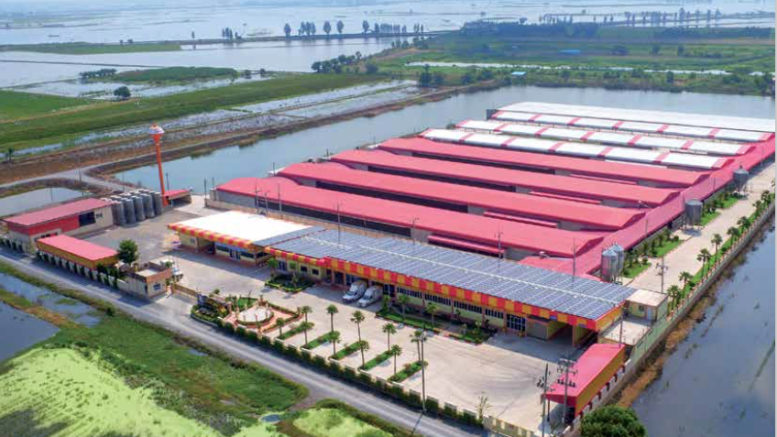Chaiyapornsahafarm (CSF) will increase production by 500,000 hens as part of a plan to export eggs to South Korea in 2018, according to Chaiyaporn Seethan, CEO.
CSF has registered subsidiary company Daily Eggs Thailand Co Ltd to oversee the new project that is to be completed in all phases by 2020. Roughly 300 milllion baht will be spent on five houses stocked with 100,000 birds each on 4.8 hectares adjacent to its first site, Pornpassorn Farm.
The new project will be fully automated to minimize labor and the risk of biosecurity failures because CSF wants to maintain a high health status flock without antibiotics.
Instead of using medications, bird health will be protected by preventative measures such as good air quality and low levels of dust and ammonia. Maintaining a hygienic environment and good biosecurity practices will be the main strategies for fending off contagious diseases such as E. coli, coccidiosis and necrotic enteritis.
Water, feed, ventilation and lighting will all be programmed to maximize bird comfort and growth performance. Eggs will be drawn from layer houses straight to egg collectors and then sent along conveyors to the packing facility. With export sales in mind, the farm layout will mimic the operational efficiency and sanitation systems of the best farms in Japan and Europe.
The expansion will help the company develop a new channel for supplying modern trade customers who prefer eggs weighing between 50-54 grams. The farm will have its own 60,000 eggs/hour capacity grading and packing facility.
At present, CSF is supplying 200,000 eggs/day produced at Focus Farm to Betagro at a fixed–yet flexible–pricing agreement. For example, the contract price can be raised in proportion to a sudden spike in the retail price, however, there is also a “Floor,” or minimum agreeable price, if egg prices plummet.
Eggs from Pornpassorn Farm are sold to wholesalers and via a company-owned shop in Suphanburi town.
Mr Chaiyaporn believes that there is still a lot of room for growth in the west of Thailand. Therefore, CSF has set an ambitious goal of increasing its market share to 50% in Suphanburi province’s market, currently estimated at two million eggs/day.
Many backyard and small producers in Suphanburi have folded due to higher operating costs and volatile egg prices. This has affected local supply, and now many eggs sold in Suphanburi are brought in from other provinces.
New policies regulating parent stock importation and the age of hens in production combined with more stringent farm standards will raise hurdles even higher for small operators, he said.
CSF has installed a 200 KW peak-capacity solar panel array which will chop up to 400,000 baht/month off its electricity bill. In the near future, it plans to upgrade its solar generating capacity to one million watts.
Export business
CSF inked a deal with a Korean egg importer last June and has sent egg samples to the Korean veterinary authorities for testing. The first shipment may leave as early as Q4, 2017.
The Korean layer industry was hit hard by a bird flu outbreak in 2016-2017 which wiped out over 30% of the country’s layers.
South Korea consumes around 45 million eggs/day. The domestic retail price is roughly six baht/egg.
Upon completion of the expansion plan, CSF will be able to export 1.4 million eggs/week weighing around 55-64 grams each.
Production
Both Pornpassorn Farm and Focus Farm have layer and pullet houses.
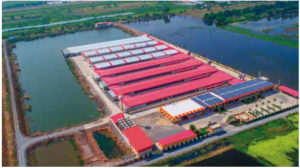
Focus Farm
Pornpassorn keeps 250,000 birds. Focus Farm is currently raising 200,000 birds.
Both sites have pullet houses capable of handling 200,000 pullets/batch.
The pullets are moved to the production house at 16 weeks of age. Pullets are currently both floor and cage reared, but CSF plans to convert the floor rearing system to pullet cages by the end of 2017. The pullets are primarily used internally and some are sold.
Floor rearing is costlier because it requires an extra 600 grams of feed/pullet vs rearing in cages. Also, age at first lay is considerably slower than for caged pullets and the birds suffer higher mortality. On the other hand, floor reared birds have remarkable persistency of lay and yield eggs with impeccable quality even in old age.
Focus Farm uses a fully automatic system and can be operated by less than 35 people. Each house (W12xL110xH4.2m) contains five tiers in four rows accommodating 50,000 birds with rearing space of 450 sq cm/bird. Each house has a 23-tonne silo which contains enough feed for three days of consumption.
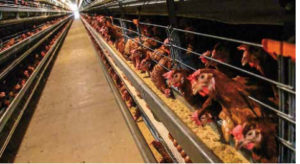
Each house holds 50,000 birds, rearing space 450 sq cm/bird
Feed is delivered from Betagro’s feed mill in Lop Buri to the farm on a daily basis by a third-party feed transportation specialist. The farm manager works closely with formulators and provides regular updates on bird performance and market preferences, which means feed formulation can be adjusted in line with market feedback.
For example, the market prefers eggs with a dark yolk colour and dark brown egg shell, he said.
Big Dutchman’s “Viper” automatic controller handles feeding, drinking and ventilation programs. Each house is fitted with 16 50-inch fans driven by 1.5 hp motors. Maximum air speed in the middle of the house is 700 feet/minute.
The housing is evaporative cooled. Typically, 10 fans are constantly operating, but additional fans can be programmed to turn on when the temperature rises above 26°C.
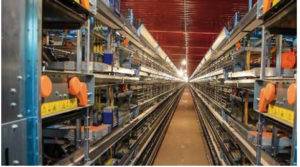
Big Dutchman’s Univent battery cage
Also, one additional fan is automatically turned on with each one degree rise in temperature. At 31°C, all 16 fans are running simultaneously. Water pumps turn on when the temperature is above 28°C with relative humidity below 95%, but shut off automatically when relative humidity exceeds 95%.
The fans are automatically shut off one- by-one as the temperature drops. Feed is automatically distributed throughout the entire house by chain feeders. The farm’s high degree of automation means that 50,000 birds can be supervised by only two workers.
To maintain top level biosecurity, workers must shower and change to farm clothes before entering the poultry houses.
There are seven gates used for different purposes. For example, manure trucks must enter the farm at the gate designated for manure trucks. Manure is removed from every house daily via a manure belt to reduce ammonia. The farm generates more than 20 tonnes of manure every day.
Similarly, there are gates designated for visitors, feed trucks, spent hen trucks, etc. A rigorous pest control program is used to eliminate salmonella vectors.
CSF uses Lohman Brown classic. Average weight at week 20 is 1.6 kg, feed consumption 115-125 grams/day, FCR 2.1-2.15/kg egg mass, and eggs per hen housed 315 at 72 weeks of age. Also, liveability averages above 90% during the laying period and average egg production per-hen-day is 85%.
The hens are depleted after 76-78 weeks or when average production per-hen-day drops below 70%.
Egg grading
Eggs are gently carried from cages via conveyor belts to collector stations in each layer house. From there, another conveyor belt takes the eggs to the central egg grading facility.
The facility has 500 sq m of work space. A wall separates low-risk and high-risk zones.
Eggs are brought in and cleaned with reverse osmosis treated water at 50°C and disinfected with chlorine at 10 ppm.
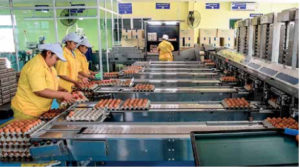
Packing centre capacity 35,000 eggs/hour
The eggs are gently brushed to remove stains and dried by blowers to remove moisture. They are disinfected with ultra-violet light and coated with oil to preserve albumin, yolk quality and reduce weight loss. The eggs are brushed again and disinfected with UV radiation for a second time before being sent for grading and packing.
The packing room is kept at 25°C. The grader is capable of handling 35,000 eggs/hour.
Currently, it takes 10 hours for the eggs to be cleaned, graded, packed and delivered to outlets in 22 provinces around Suphanburi.
Breakage is below 0.1% per day. It keeps zero stock, which means all the eggs have to be delivered to clients every day.
The grading system uses the following criteria: jumbo size (above 70 g) accounts for 8% of total production on average, grade 1 (65-69 gms) 35%, grade 2 (60-64gms) 45%, grade 3 (55-59 gms) 10%, grade 4 (50-54gms) 2%.
As the company prepares for exporting eggs to Korea in Q4, 2017, it is also working on GMP and Thailand’s Q-Mark registration. Both are expected to be completed before the end of 2017.
An electrical engineer by training, Mr Chaiyoparn has always had a passion for agriculture. Alongside his engineering career, he started a small layer farm prior to 2003 that grew to reach 100,000 birds by 2012. The company will continue to invest in increased capacity to capture future opportunities as they arise, he said.

